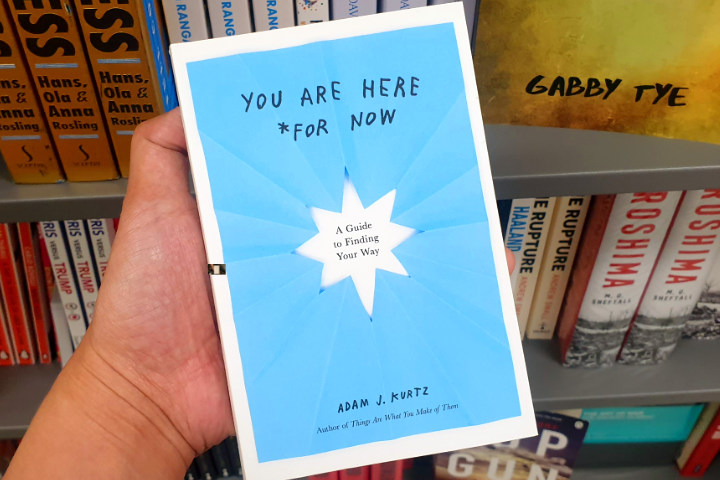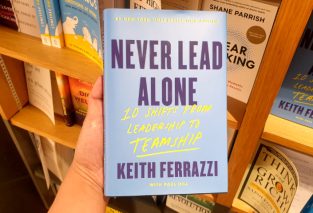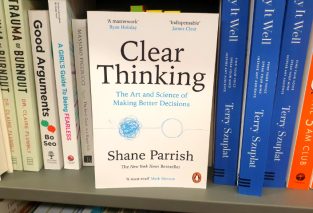Find comfort in life’s uncertainties with honest advice and humor. Embrace imperfections, navigate challenges, and focus on personal growth and self-acceptance in the present moment.

In You Are Here (For Now), Adam Kurtz crafts a love letter to the beautiful mess of life.
His ability to blend personal introspection with humor creates a captivating narrative that serves both as a self-help guide and an invitation to embrace the quirky, fleeting nature of existence.
The book reads like an illustrated diary, a patchwork of thoughts that span from the hilarious to the deeply poignant.
A reflection on the transient nature of existence, woven together with threads of humor, vulnerability, and raw honesty.
In a somewhat signature mix of honesty and humor, the author invites readers to reflect on their own lives, reminding us that the chaos we experience isn’t something to escape from but to find meaning within.
What immediately grabs the reader’s attention is Kurtz’s voice.
It’s refreshing, relatable, and peppered with a dry wit that’s impossible to ignore.
He doesn’t sugarcoat life’s challenges. Instead, he encourages us to face them head-on with an almost sardonic sense of humor.
This humor is no mere gimmick. It’s the vehicle that helps him convey some pretty heavy truths about life, love, and self-worth.
At times, it feels like you’re reading an old friend’s letter, one that’s both playful and profoundly wise.
His straightforward approach to life’s complexities invites you to let go of pretenses and simply be. This is not a book that tells us how to live. It reminds us how we’re already living, with all of our flaws and uncertainties intact.
A thoughtful exploration of what it means to be present in the moment, making the book both a mirror and a map for self-discovery.
The book’s unique structure mirrors a “messy” philosophy. Where it doesn’t follow a linear path but instead dips in and out of different themes and moments, as though each chapter is a reflection in a mirror. One that shows a fragmented yet beautiful whole.
Through hand-drawn illustrations and short, almost aphoristic passages, the reader is guided through the ever-shifting landscapes of adulthood, doubt, and growth.
And it’s within these shifting terrains that the author’s message becomes clear: life is fleeting, unpredictable, and often difficult, but it’s also worth savoring.
His words are like a gentle nudge, encouraging introspection without the weight of judgment.
He takes what could be cliché self-help advice like “be present” or “embrace imperfection”, and re-packages it in such a way that it feels fresh, funny, and alive.
This unique writers’ ability to distill complex emotions into simple truths is akin to a master chef creating a gourmet meal from basic ingredients. Cumulating to a result that is nourishing and satisfying.
What is perhaps most engaging about the book is that it allows space for the reader to reflect without pressuring them to come to any specific conclusions.
There’s no formula for happiness here. The humor is let loose to do its work, coaxing out realizations from a place of gentle insight rather than heavy-handed preaching.
For instance, in one section, Kurtz discusses the emotional rollercoaster of adult life with a candidness that is both sobering and humorous. If way we all keep striving for the next “big thing” without appreciating where we are in the moment, then we should all start looking forward to the mundane.
That insight is wrapped in a joke that, while funny, also forces us to question the way we view life’s ordinary moments.
In another memorable instance, you might come to think of life as like a poorly written sitcom pilot. Full of plot holes, but you stick around hoping it gets better in the next episode. Such moments remind us not to take ourselves too seriously and to embrace the absurdity of our own paths.
It’s moments like this where the ordinary and extraordinary are blended into a quiet brilliance.
There’s a quiet tenderness in his acceptance of life’s messiness. And in this acceptance, there is freedom.
The personal illustrations are the perfect complement to the writing. Simple, yet emotionally resonant. They add texture to the words, like the subtle background of a favorite song that sets the mood without overpowering the lyrics.
Each sketch feels like a quick thought that’s been captured in the moment, much like the book itself.
The drawings aren’t always perfect, but that’s part of their charm. They echo the imperfection of the human experience.
It emphasizes that we don’t need to be polished to find meaning or joy.
That, in itself, is one of the core messages of the book. Our flaws and quirks are not hindrances to be corrected but vital parts of our human story.
In a world obsessed with perfection, You Are Here is a reminder that there’s beauty in the “unfinished.”
Shortcomings
There are times when you will feel that the lighthearted approach to serious topics feel like glossing over deeper issues.
Kurtz does not shy away from acknowledging the messiness of life, but at times, his humor can make it hard to fully engage with the weight of the subject matter.
It’s as if he’s holding up a mirror to the uncomfortable parts of life but then quickly moves on to a new reflection, leaving the deeper emotional work undone.
For example, his discussions of mental health and the struggles that come with it are often framed with humor, but in some instances, the levity might risk underplaying the intensity of those experiences.
Humor is a powerful tool for dealing with pain, but at times, I find that it really lacks depth.
Perhaps, by slowing down and giving more space to some of these more difficult topics, the book could have made an even stronger emotional impact.
The brevity of certain essays may also leave readers yearning for a more comprehensive exploration of topics such as resilience or personal growth.
His breezy style makes it harder for the reader to linger in the heaviness that life sometimes brings.
There is also an occasional repetition of themes that, while comforting, can start to feel a bit like a broken record.
The idea that we are all “here for now,” with all our imperfections and fleeting moments, is lovely, but the same sentiment is reiterated so often that it sometimes loses its edge.
While this might be a deliberate strategy to reinforce the central message, it could have benefited from a bit more variety.
The book might have had even more of an impact if it incorporated a broader range of reflections. Perhaps diving into specific life events or offering more diverse perspectives on the journey of self-acceptance.
Sometimes, the humor felt like it was playing it a little too safe, relying on the same types of jokes or insights, which could have been expanded upon.
Biggest Takeaway
This is an invitation to embrace life exactly as it is, in all its chaotic glory.
It does not preaching perfection. It’s offering us the chance to celebrate the mess, to find peace in the process of living instead of chasing some unattainable ideal.
The book doesn’t offer solutions so much as it offers company, companionship through the wild and unpredictable journey that is life. It encourages us to stop striving for some distant version of ourselves and to simply live in the now. because, as Kurtz gently reminds us, that’s really all we have.
When life feels like it’s all over the map, it’s still worth the trip. After all, the journey’s never quite as “straight” as we think it should be. And it’s not about finding the exit. It’s about enjoying the detours along the way. And if you happen to stumble upon a dead end, just think of it as life’s way of telling you to turn around and try another path.
Appreciate where we are in this moment.
Learn to find beauty in the mundane and cherish the fleeting connections that shape our lives. This perspective is both grounding and liberating, allowing us to find peace amidst chaos.
This book is a heartfelt meditation on existence, filled with wisdom and wit that linger long after the final page is turned.
This book is crafted to resonate with anyone seeking meaning in the midst of life’s uncertainties.
As we journey through its pages, we are reminded that while our time here may be temporary, our capacity for connection and growth is boundless.




